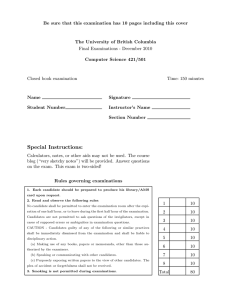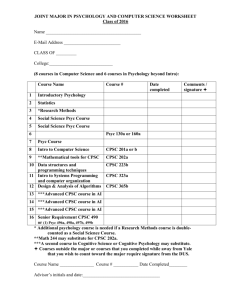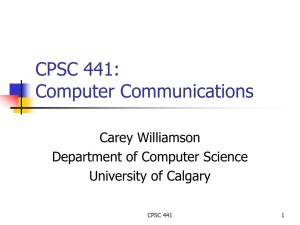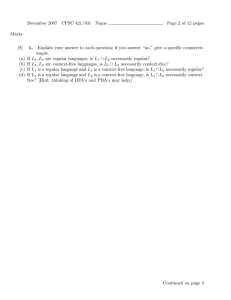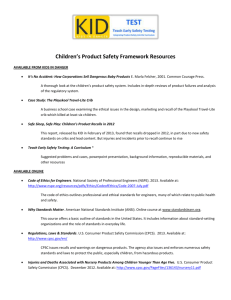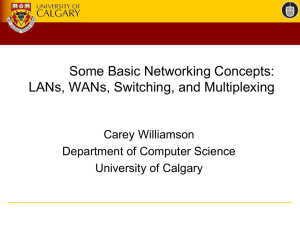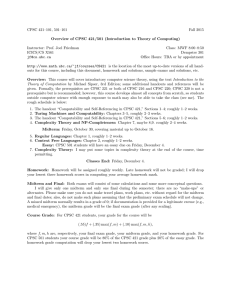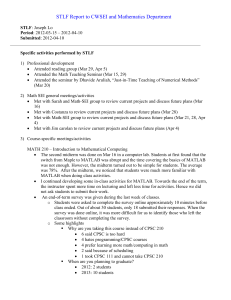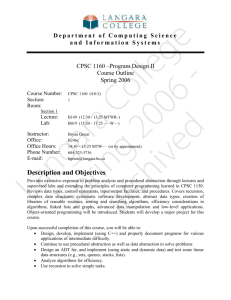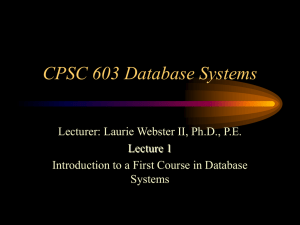CPSC 129 Object Oriented Programming II
advertisement
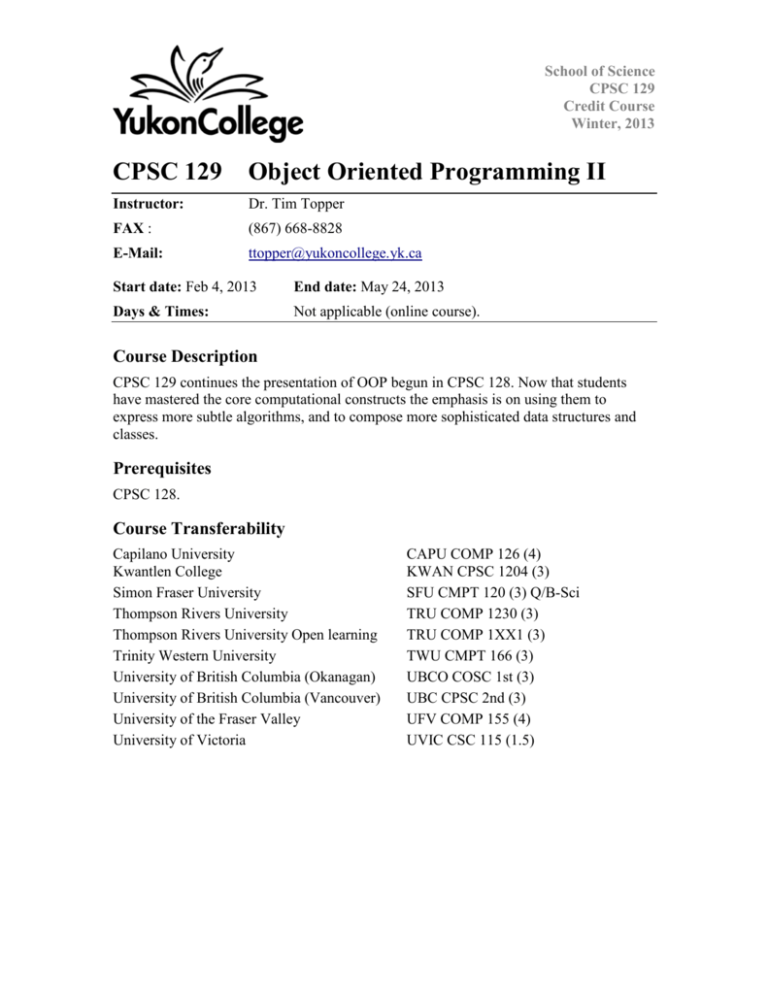
School of Science CPSC 129 Credit Course Winter, 2013 CPSC 129 Object Oriented Programming II Instructor: Dr. Tim Topper FAX : (867) 668-8828 E-Mail: ttopper@yukoncollege.yk.ca Start date: Feb 4, 2013 End date: May 24, 2013 Days & Times: Not applicable (online course). Course Description CPSC 129 continues the presentation of OOP begun in CPSC 128. Now that students have mastered the core computational constructs the emphasis is on using them to express more subtle algorithms, and to compose more sophisticated data structures and classes. Prerequisites CPSC 128. Course Transferability Capilano University Kwantlen College Simon Fraser University Thompson Rivers University Thompson Rivers University Open learning Trinity Western University University of British Columbia (Okanagan) University of British Columbia (Vancouver) University of the Fraser Valley University of Victoria CAPU COMP 126 (4) KWAN CPSC 1204 (3) SFU CMPT 120 (3) Q/B-Sci TRU COMP 1230 (3) TRU COMP 1XX1 (3) TWU CMPT 166 (3) UBCO COSC 1st (3) UBC CPSC 2nd (3) UFV COMP 155 (4) UVIC CSC 115 (1.5) CPSC 129 Object Oriented Progamming II School of Science Winter, 2013 Learning Outcomes A student who successfully fulfills the course requirements will have demonstrated the ability: to produce an object-oriented (OO) analysis and design for a problem. to apply the principles of class inheritance, composition, and association to construct hierarchies of new classes. to use the components and constructs necessary to implement an OO program in efficient, reusable, extensible code. to design alternative algorithms to solve a variety of problems. to design alternative data structures to represent the information necessary to solve a variety of problems. to evaluate programs through the careful application of appropriate testing techniques to assess both their correctness and their memory and processor performance characteristics. to document the analysis, design, implementation and testing of a program constructed using OO principles. Delivery Methods/Format This is an online offering of CPSC 129. Content. The course is divided into 12 modules (see above) and all the content for these modules is provided online. Web pages provide notes on the topics, and online videos demonstrating and illustrating key points and procedures. Coursework. Students will complete and submit an assignment for each module, and receive feedback online. Student-teacher interaction. Every effort will be made to provide rich student-teacher interaction. To this end students are able to interact with the instructor by email, or via the course discussion forum. Scheduling. There is a minimum pace of one module per week. This minimum pace is absolute: Late assignments are not accepted. However students may go faster than this to complete the course early or just to create a time cushion for themselves. Getting ahead can provide breathing room to sort out any difficulties you may encounter in the later modules. The course content is divided into 12. Each module represents a roughly equal amount of work. In this offering of the course one module should be completed each week, though students are free to proceed more quickly than this. CPSC 129 Object Oriented Progamming II School of Science Winter, 2013 The completion deadlines for the modules are: Module Completion Deadline 1 Feb 10 2 Feb 17 3 Feb 24 Spring Break Mar 4-15 4 Mar 17 5 Mar 24 6 Mar 31 7 Apr 7 8 Apr 14 9 Apr 21 10 Apr 28 11 May 5 12 May 12 Final Exam May 24 Workload: Students typically take between 120 and 240 hours to complete the course. Evaluation The final grade for this course will be based on the following: Assigned work (50%): Twelve assignments (one per module) will be given that cover all of the material in the course. Note that all assignments have equal weight, regardless of the total they are marked out of. Final Examination (50%): A comprehensive final examination will be given at the end of the course. Students will write the exam at the Whitehorse campus of Yukon College. N.B. There is no opportunity to rewrite the final examination, nor to write a supplemental examination. Assignments 50% Final Examination 50% Total 100% CPSC 129 Object Oriented Progamming II School of Science Winter, 2013 Textbook No textbook is required for this course. All the necessary content is provided through the course websites. Additional Equipment and Supplies You will require a computer with an internet connection and a modern browser. You will be installing the Python programming environment on the computer. Plagiarism Plagiarism involves representing someone else’s work as your own, without citing the source from which the material is taken. If the words of others are directly quoted or paraphrased, they must be documented according to standard procedures (APA). The resubmission of a paper for which you have previously received credit is considered a form of plagiarism. Plagiarism is academic dishonesty, a serious academic offence, and will result in you receiving a mark of zero (F) on the assignment or the course. In certain cases, it can also result in dismissal from the college. And do not underestimate the impact such a situation will have on your reputation. More detailed guidelines on plagiarism in the context of programming will be provided as part of the online course materials. Students with disabilities or chronic conditions Reasonable accommodations are available for students with a documented disability or chronic condition. It is the student’s responsibility to seek these accommodations. If a student has a disability or chronic condition and may need accommodation to fully participate in this class, he/she should contact the Learning Assistance Centre (LAC) at (867) 668-8785 or lassist@yukoncollege.yk.ca.
